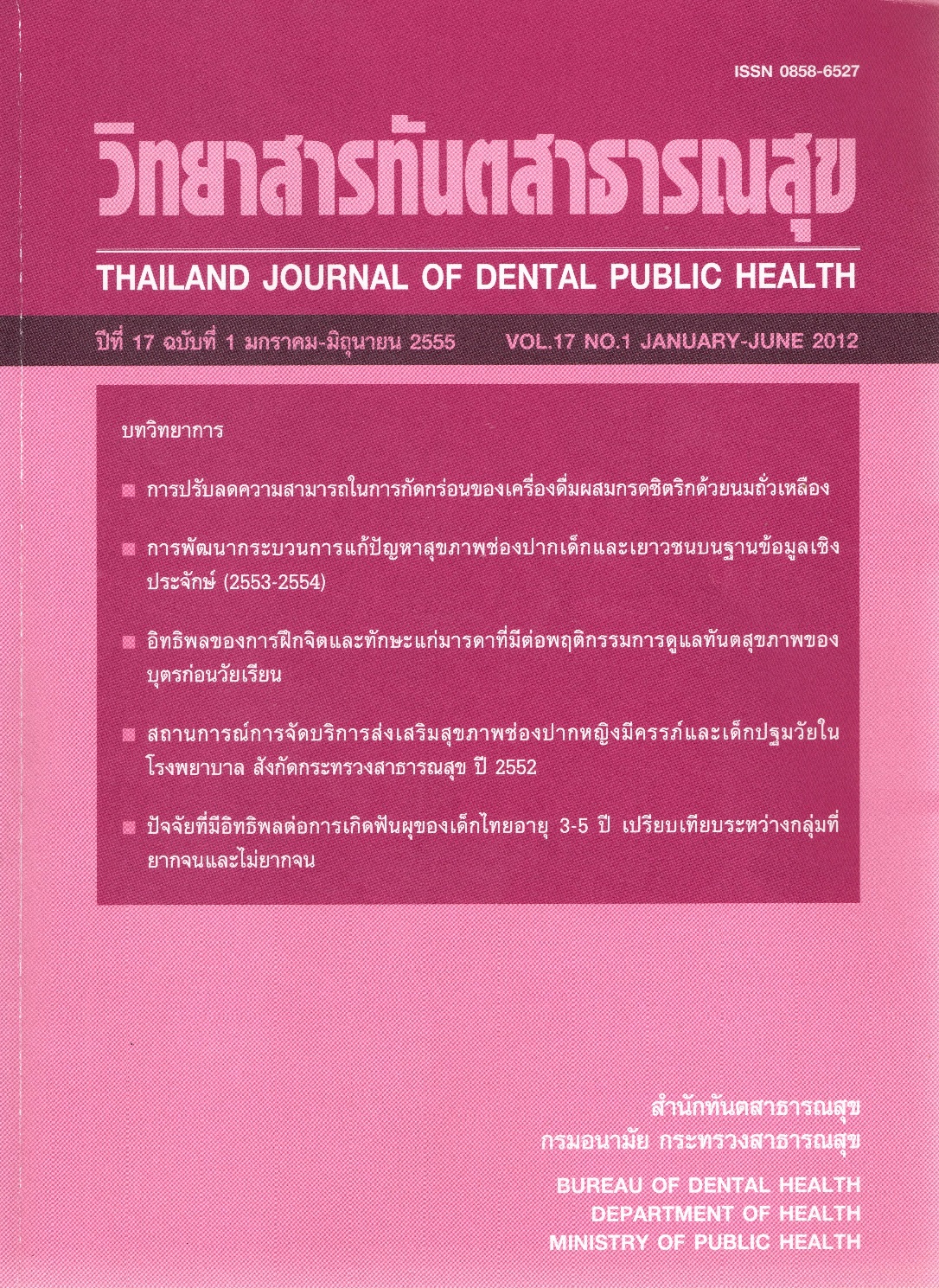Effects of Maternal Psycho - Skill Training on Dental Health Care Behavior for Preschoolers
Main Article Content
Abstract
Major objective of this Experimental-evaluative study was to study the effects of psycho-skill training on dental health care behavior of mothers of preschoolers. The training set composed of psychological characteristics set (future orientation, self control, belief in internal locus of control concerning health) and dental health skill set. There were 16 questionnairs used to assess all variables and assessed in 3 times: before training, 3 months after training. Random sampling from mothers of preschoolers who applied for training were employed to obtain 322 mothers that have been trained. Thus the model of LISREL 8.25 model was performed to test model in mothers of preschoolers displayed the following results : 1) Model of the causal relationship of dental health care behavior of mothers of preschoolers of all samplings : 322 persons, variable 2 type of trainings directly influenced to 6 psychological characteristics (immediately after training; Path coefficients .43 and to 3 variables of psychological characteristics (3 months after training; Path coefficients .79 and 6 variables of psychological characteristics (immediately after training) directly influenced to 3 variables of dental health care behavior (Path coefficients .59). Moreover. 3 variables of psychological characteristics (3 months after training) and 3 variables of dental health care behavior had positive relationship.
Downloads
Article Details
References
2. อังคณา เธียรมนตรี, สุณิสา วงศ์แสนใหม่, จรัญญา หุ่นศรีสกุล และศุลิมาน (นฤมล) วงศ์สุภาพ. กระบวนการเลี้ยงดูที่สัมพันธ์กับสุขภาพช่องปากเด็กอายุ 0-3 ขวบ : กรณีศึกษาในชุมชนไทยพุทธและไทยมุสลิมแห่งหนึ่ง อําเภอเทพา จังหวัดสงขลา, วิทยาสารทันตแพทยศาสตร์ 2552 ; 59 :233 - 43.
3. Huntington N.L., Kim I.J. & Hughes C.V. Caries-risk factors for Hispanic children affected by early childhood caries. Pediatr Dent 2002 ; 24: 536-42.
4. Ohsuka K., N. Chino. et al. (2009). Analysis of risk factors for dental caries in infants: a comparison between urban and rural areas. Environ Health Prev Med 14(2): 103-1
5. Wiennhall I, Matsson L, Schrader U. & Twetman S. Caries prevalence in 3-year-old children living in a low socio-economic multicultural urban area in southern Sweden. Swed Dent I 2002; 26 : 167-72.
6. Du M., Bian Z., Guo L., Holt R., Champion J. & Bedi R. Caries pattern and their relationship to infant feeding and socio-economic status in 2-4-yearold Chinese children. Int Dent J 2000; 50 : 385-9.
7. Al-Malik M.I., Holt R.D. & Bedi R. The relationship between erosion, caries and rampant caries and dietary habits in preschool children in Saudi Arabia. Int Dent J 2001; 11: 430-9.
8. Rajab L.D. & Hamdan M.A. Early childhood caries and risk factors in Jordan. Community Dent Health 2002; 19:224-9.
9. Thitasomakul S. Dental Caries, Oral hygiene and Dietary Habits, Aarhus : The University of Aarhus, Faculty of Health Sciences; 2000.
10. จุไรรัตน์ คุณะไชยโชติ และอุบลวรรณ ธีระพิบูลย์, ความสัมพันธ์ระหว่างวินัยของพ่อแม่กับการเกิดฟันผุของลูก. วิทยาสารทันตแพทยศาสตร์ 2550 : 57:265 – 74.
11. Skeie M.S., Raadal M., Strand G.V. & Espelid L. The relationship between caries in the primary dentition at 5 years of age and permanent dentition at 10 years of age - a longitudinal study. Int J Pediatr Dent 2006; 16: 152-60
12. Acs G., Lododini G., Kaminski S. & Cisneros G.J. Effect of nursing caries on body weight in a pediatric population. Pediatr Dent 1992 ; 14:302-5.
13. Tinanoff N., Kanellis M.J. & Vargas C.M. Current understanding of the epidemiology, mechanism and prevention of dental caries in preschool children. Pediatr Dent 2002: 24: 543-51.
14. วรวรรณ อัศวกุล, รัชนี ลิ้มสวัสดิ์, สุมาลี อรุณรัตนดิลก, พรรณี ผานิดานันท์ และจิระนันท์ พากเพียร.ปัจจัยทางจิตสังคมที่เกี่ยวกับพฤติกรรมของมารดาในการดูแลทันตสุขภาพแก่บุตรก่อนวัยเรียน, รายงานการวิจัยฉบับสมบูรณ์ทุนอุดหนุนการวิจัย ประเภทการวิจัยและพัฒนาระบบพฤติกรรมไทย สํานักงานคณะกรรมการวิจัยแห่งชาติ: (วช.) : 2546.
15. ปิยะนุช ดวงกางใต้, ปัจจัยทางจิตสังคมที่เกี่ยวข้องกับพฤติกรรมมารดา ในการดูแลการบริโภคอาหารแก่บุตรก่อนวัยเรียน. ภาคนิพนธ์ ปริญญามหาบัณฑิต สถาบันบัณฑิตพัฒนาบริหารศาสตร์; 2551.
16. สกล เที่ยงแท้ และสุมิตรา เจิมพันธ์, ผลการฝึกจิต-พฤติกรรมแบบบูรณาการต่อพฤติกรรมการขับขี่อย่างปลอดภัยของ นักเรียนวัยรุ่นตอนต้น. รายงานการวิจัยฉบับสมบูรณ์ทุนอุดหนุนการวิจัยประเภทการวิจัยและพัฒนาระบบพฤติกรรมไทย สำนักงานคณะกรรมการวิจัยแห่งชาติ (วช.) ; 2546.
17. บุญรับ ศักดิ์มณี. การเสริมสร้างจิตลักษณะเพื่อพัฒนาพฤติกรรมการทำงานราชการ ปริญญานิพนธ์การศึกษาดุษฎีบัณฑิต สาขา พัฒนศึกษาศาสตร์ มหาวิทยาลัยศรีนครินทรวิโรฒ, 2532.
18. เมธินี คุปพิทยานันท์, ประสิทธิผลของการ ไทย สำนักงานคณะกรรมการวิจัยแห่งชาติฝึกอบรมทางจิตพฤติกรรมศาสตร์เพื่อปลูก (วช.) ; 2546. ฝังและพัฒนาพฤติกรรมทันตสุขภาพเด็ก
19. พิสมัย วิบูลย์สวัสดิ์, นิภา วินิจ, พรพิมล วรวุฒิพุทธพงศ์, สงคราม เชาวน์ศิลป์ และพิมพ์ชนก เครือสุคนธ์.ผลของการฝึกจิต ลักษณะและทักษะการพัฒนาเพื่อนต่อการช่วยเพื่อนป้องกันความเสี่ยงต่อโรคเอดส์ในนักศึกษาชายระดับอุดมศึกษา รายงานวิจัยฉบับสมบูรณ์ ทุนอุดหนุนการวิจัย ประเภทการวิจัยและพัฒนาระบบพฤติกรรมไทยสำนักงานคณะกรรมการวิจัยแห่งชาติ (วช.) ; 2547.
20. เกรียงศักดิ์ ไชยยา การสอนสุขศึกษาโดยใช้วิธีการเรียนรู้จากปัญหาในการป้องกันโรคเอดส์ของนักศึกษาวิทยาลัยเทคนิคระนอง กรุงเทพฯ : มหาวิทยาลัยมหิดล : 2534
21. เรณุมาศ มาอุ่น, เจิดหล้า สุนทรวิภาต และ (วช.) : และกุลยา ตันติผลาชีวะ, ประสิทธิผลของการฝึกอบรมทางจิตพฤติกรรมศาสตร์เพื่อเสริมสร้างพฤติกรรมการป้องกันโรคเอดส์ในนิสิต นักศึกษาชายในมหาวิทยาลัย. รายงานการวิจัยฉบับสมบูรณ์ ทุนอุดหนุนการวิจัยประเภทการวิจัยและพัฒนาระบบพฤติกรรมไทย สำนักงานคณะกรรมการวิจัยแห่งชาติ (วช.) ; 2546.


